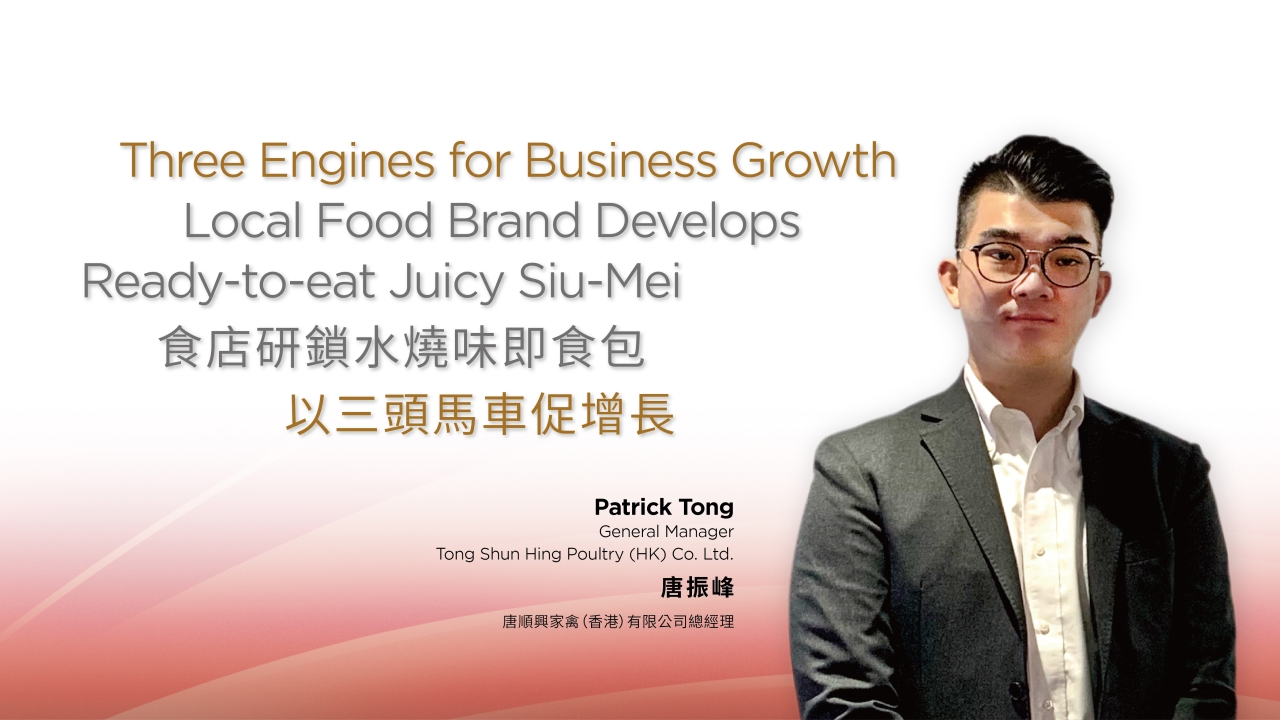
Three Engines for Business Growth Local Food Band Develops Ready-to-eat Juicy Siu-Mei
Siu-Mei (Hong Kong-style roasted meat) and Lou Mei (dishes made by braising in a sauce) are the second most popular cuisine among Hongkongers, according to the Hong Kong Population-based Food Consumption Survey conducted by The Centre for Food Safety. A survey also estimated that a staggering 66,233 tons of Siu-Mei are consumed by Hong Kong people every year. These are the reasons why Tong Shun Hing Poultry (HK) Co. Ltd, established in the 90s supplying roasted pigeon in Shatin, has grown into one of the leading poultry suppliers in Hong Kong. Taking up 25% of the market share, Patrick Tong, General Manager of Tong Shun Hing stated, “With our one-stop manpower resources and cost advantages, we believe poultry, frozen meat and pre-cooked foods will be the ‘3 growth engines’ that help us thrive.”
The Tripartite Way Forward for Business
Having gone through several outbreaks of Avian influenza, Tong Shun Hing has diversified their business in the early years in 2000s. They have expanded from supplying poultry to selling frozen meat, and also from wholesale to retail, and catering businesses. In addition to the Siu-Mei restaurants operated under Tong Shun Hing, they are also selling ready-made Siu-Mei & Lou Mei, Hainanese chicken, soup packs under the brand names like Day Fresh and Happy Farm.

“As wholesalers, we can easily satisfy our clients by offering low-priced, high quality products, but this is not the same for restaurant business - we not only need to offer great products at low price, but also fast and excellent service. For retail business, besides ensuring product quality, we need to take extra efforts in marketing and promotion to win popularity. Though we are a well-established, 30-year-old brand be known for our trustworthiness, we still need to go with the trend and increase our brand exposure. ”
A Head Start in Production Line Supported by Technology
Patrick believes that Siu-Mei industry also needs to transform: the manufacturing process of Siu-Mei used to rely on manual labor and their experience, but as old chefs retire, they face talent shortage. Therefore the company has introduced automatic equipment such as smart roasters and dehydrators. “We are developing a ready-to-eat Siu-Mei pack that can lock in the moisture of the meat even after reheating in the microwave. This would make takeaway Siu-Mei more palatable.”


With its warehouse and fulfillment center relocated to Ping Shan at Yuen Long, they now enjoy geographical advantage in transporting between Mainland and Hong Kong. Spanning an area of 80,000 sq. ft., the center can accommodate their self-owned fleet of over 30 cold chain trucks equipped with temperature control system to ensure food quality. The company has also developed a traceability system based on barcodes to improve management efficiency with technology.
“Apart from utilizing GS1 barcode to identify individual products, we have also learned many practical skills on supply chain traceability from GS1 HK team that enable us to up our game with better food safety, food processing and tracking process. ‘Industry 4.0’ and smart manufacturing trends are becoming mainstream, so we will invest more resources in research and development in those areas to enhance our management effectiveness and efficiency.” Having participated in the Quality Food Scheme for five consecutive years since 2018, Tong Shun Hing has been promoted from Gold Enterprise Award to Diamond Enterprise Award, which is a testament to its company culture of striving for the best.

Stringent Preventive Measures to Minimize Impact of COVID-19
Though the pandemic has deeply affected the wholesale business, the sales surge in retail, takeaway businesses of restaurants and online sales offset the impact. On the other hand, the freight logistics arrangement between Mainland China and Hong Kong was the major challenge. “Our logistics schedule was greatly disrupted by the pandemic, we have therefore responded by implementing a ‘close loop management’. After each ride, trucks will be sanitized thoroughly, and their drivers are required to conduct COVID-19 rapid-antigen test. In addition, staff handling food will be equipped with personal protection equipments and food processing workspace will be cleaned and sanitized for 4 times a day to avoid cross contamination and safeguard food hygiene & safety.” Patrick admitted that all these measures may not guarantee zero infection, so he took extra steps to educate his customers to cook the food thoroughly before consumption to minimize the potential impact.

Tong Shun Hing has 4 production lines in Weizhou, China, realising one-stop operations from poultry farming, slaughtering, food processing and logistics. As a Hong Kong brand managed locally, Patrick believes that Hong Kong products have competitive edges that should be promoted.
Patrick acknowledged that GS1 HK’s 1QR can help enhance product credibility, tap into consumers’ habit of “search before purchase” and boost sales by enabling consumers to obtain useful information such as company certifications, nutrition or even promotion, simply by scanning the QR code.
Speaking as one of the leading poultry importers in Hong Kong, Patrick hopes the Government could provide more support to the industry, for example, subsidy schemes on rental and license to propel industry development. In his point of view, Hong Kong food products are considered to be safer, better in quality, and more reliable among China customers, therefore he wishes the Government can strengthen promotion of Hong Kong products in China, especially in the Greater Bay Area. Better measures to facilitate cross-border trade are also needed to motivate Hong Kong brands to enter into China market.




